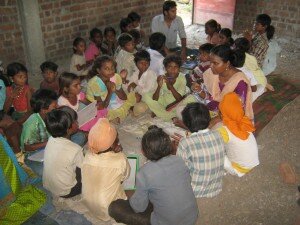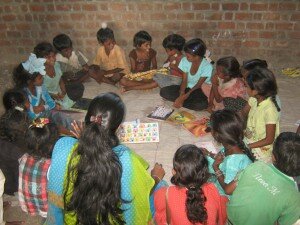![]()
February 5, 2015
Barwani district was formed on 25th May 1998. It was carved out of West-Nimar, Khargone district. Barwani is situated in the south-west side of Madhya Pradesh and river Narmada flows from its northern border. District is surrounded by Satpuda (in South) and Vindhyachal (in North) forest ranges. In 2011, Barwani had population of 1,385,659, of which male and female  were 699,578 and 686,081 respectively. 85 % population of this district belongs to Scheduled Castes. The proposed area for distribution of solar lights has no industry and its economy is totally dependent on agriculture. At the same time this is a draught prone area. Single crop pattern is mostly practiced by the farmers. The major crops grown are food crops like Jawar, Bajra, Maize, cotton, chilly and wheat etc. In addition to these situations the people of rural Barwani is not getting sufficient electricity which hinders the works and study of students especially in night. The people of this area are affected by extremely poverty and area is underdeveloped. As per the Below Poverty Line (BPL) survey of 2003, out of total families surveyed, 59.20% families are living below poverty line. Due to poverty and draught, a large section of the population from rural Barwani is forced to migrate in the winter season to nearby town of Barwani block, neighboring states of Gujarat and Maharashtra for employment.
were 699,578 and 686,081 respectively. 85 % population of this district belongs to Scheduled Castes. The proposed area for distribution of solar lights has no industry and its economy is totally dependent on agriculture. At the same time this is a draught prone area. Single crop pattern is mostly practiced by the farmers. The major crops grown are food crops like Jawar, Bajra, Maize, cotton, chilly and wheat etc. In addition to these situations the people of rural Barwani is not getting sufficient electricity which hinders the works and study of students especially in night. The people of this area are affected by extremely poverty and area is underdeveloped. As per the Below Poverty Line (BPL) survey of 2003, out of total families surveyed, 59.20% families are living below poverty line. Due to poverty and draught, a large section of the population from rural Barwani is forced to migrate in the winter season to nearby town of Barwani block, neighboring states of Gujarat and Maharashtra for employment.
As a part of “One Million Lights campaign” we will be able to help lighting up the life of 200 students of Barwani district. Because the solar lights will help these students of the village to study beyond sunset. The time they will save by not going to the forest to collect firewood can be spent on new learning’s, agricultural work for their own consumption as well as selling it to neighboring villages. As a result they will have more & better job opportunities if they will have well study without disturbance/worry of light and also will get a chance to increase in income level in future by study.
Now the shops in these villages run only until about 6 in the evening or close before sunset. But with solar lamps in place the shopkeeper will be able to run his shop till about 9 pm, sell more and earn more. Currently the womenfolk in this village do all their household chores like cooking before sunset, but with solar lamps they can work through the day and use them to cook food at night. They will save two to three hours every day and use it to produce goods, helping add to their income and for their further development.
Please consider donating to this project today.
